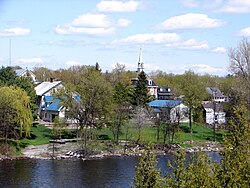Portage-du-Fort, Quebec
| Portage-du-Fort | |
|---|---|
| Village municipality | |
 |
|
 Location within Pontiac RCM. |
|
| Location in western Quebec. | |
| Coordinates: 45°36′N 76°40′W / 45.600°N 76.667°WCoordinates: 45°36′N 76°40′W / 45.600°N 76.667°W | |
| Country |
|
| Province |
|
| Region | Outaouais |
| RCM | Pontiac |
| Settled | 1844 |
| Constituted | January 1, 1863 |
| Government | |
| • Mayor | Lynne Cameron |
| • Federal riding | Pontiac |
| • Prov. riding | Pontiac |
| Area | |
| • Total | 4.20 km2 (1.62 sq mi) |
| • Land | 4.36 km2 (1.68 sq mi) |
| There is an apparent contradiction between two authoritative sources |
|
| Population (2011) | |
| • Total | 266 |
| • Density | 61.0/km2 (158/sq mi) |
| • Pop 2006-2011 |
|
| • Dwellings | 152 |
| Time zone | EST (UTC−5) |
| • Summer (DST) | EDT (UTC−4) |
| Postal code(s) | J0X 2T0 |
| Area code(s) | 819 |
| Highways |
|
Portage-du-Fort is a village municipality in the Pontiac Regional County Municipality in the southwest corner of the Outaouais region of Quebec, Canada. The village lies across the Ottawa River from Chenaux, Ontario.
At Portage-du-Fort there is a dam, the Chenaux Hydro-Electric Power Station, and bridge across the Ottawa River.
Portage-du-Fort is named after the portage trail which started here and would lead upstream around a set of falls on the Ottawa River.
However, there are several hypotheses to explain the "Fort" portion. Among the most popular is the assumption that a fort was present here on the shore of the Ottawa River to keep provisions at the portage. It has been claimed that a fort called Dufort was flooded in the rapids at this location. However, some researchers argue that the fort in question has never existed and may be a reference to another fort at the mouth of the Coulonge River (after which modern Fort-Coulonge is named). Moreover, the word formerly did not always convey a military connotation and could be more or less synonymous with a village or hamlet, or even a post or warehouse which was fortified.
One theory suggests that the name goes back to a custom of the Algonquins who would paint their bodies here and it was originally named Portage du Fard (French for "make-up"), which changed into "Fort".
Another possibility is that Fort (French also for "strong") makes reference to the strength needed to haul the heavy canoes and supplies over the arduous portage.
But there is no certainty on any of these theories.
In 1611, a French scout named Nicolas de Vignau arrived at this site together with a group of Algonquins while on their way to Allumette Island. From here they had to portage around a series of 5 difficult waterfalls on the Ottawa River. The portage from Harbor Square to Bentley's Landing is one of the oldest trails in North America because the Native peoples inhabiting the valley have used it for thousands of years.
...
Wikipedia

